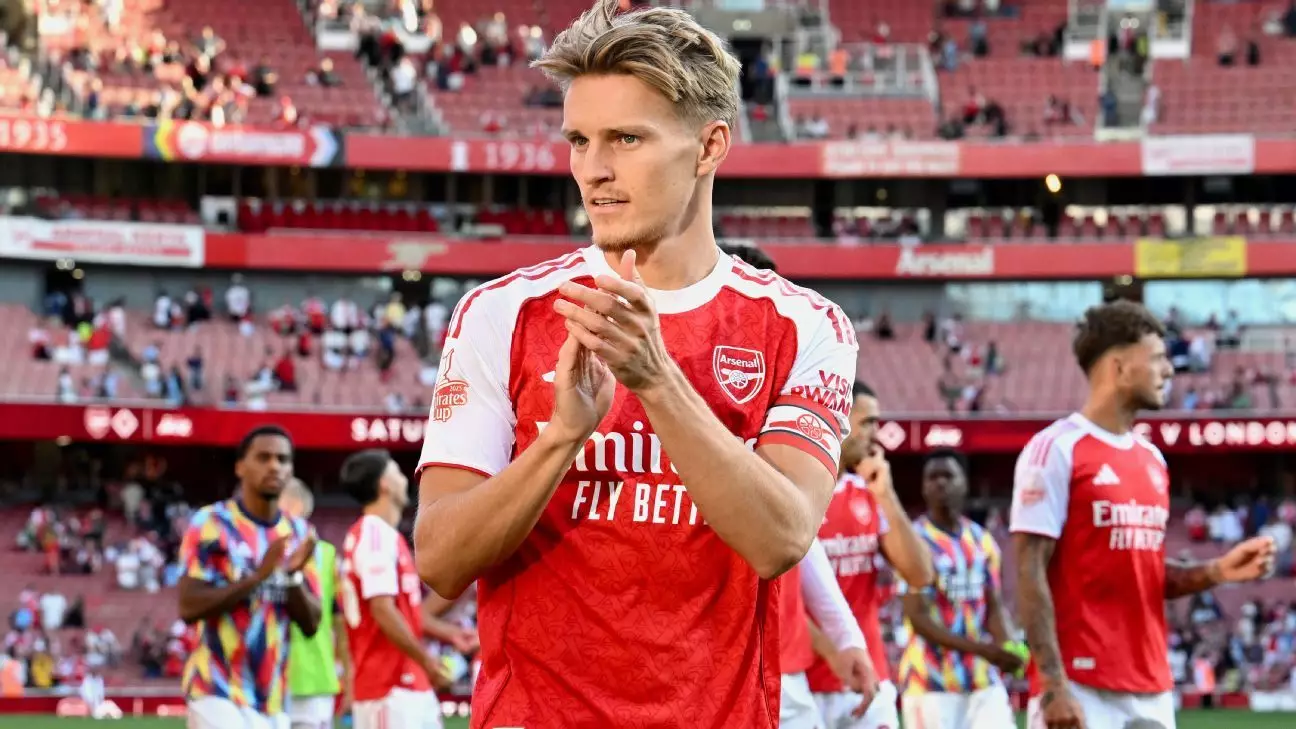In the competitive landscape of the Premier League, leadership on the pitch often becomes a focal point of contention and debate. Mikel Arteta’s recent defense of Martin Ødegaard’s captaincy exemplifies a leadership rooted in trust, collective opinion, and strategic patience. Despite vocal criticisms from former Arsenal captain Tony Adams, who questions Ødegaard’s effectiveness as a leader, Arteta stands firmly in his conviction that the team’s verdict—unanimous in favor of the Norwegian midfielder—is the true measure of legitimacy. This stance isn’t merely about maintaining tradition but rather an assertion that leadership should be a reflection of the players’ collective confidence, not just a coach’s preference or a veteran’s reputation.
The decision to retain Ødegaard arose in the wake of squad changes, notably following Jorginho’s departure. Arteta’s statement reveals a deeply democratic approach: he involved the players directly in the decision-making process, asking for their votes. The overwhelming support for Ødegaard highlights a critical insight into modern team dynamics—players are increasingly empowered to influence leadership roles. This confidence in player-led decision making signals a broader understanding that leadership isn’t just bestowed from the top but is earned and validated through peer recognition. Arteta’s stance challenges the traditional hierarchy, suggesting that leadership’s true strength lies in unity and consensus rather than individual accolades or historical precedence.
Critics like Adams often operate under the assumption that experience and vocal dominance necessarily translate into better leadership. However, Arteta subtly dismisses this notion, emphasizing that leadership is fundamentally about trust and effectiveness perceived by those on the pitch. If players feel that Ødegaard can rally, motivate, and support them during crucial moments, then their collective judgment should outweigh external opinions. This stance promotes a more progressive, player-centric vision of leadership—an approach that might serve Arsenal better as they strive for sustained success.
The Evolving Role of Leadership in Modern Football
The debate surrounding Ødegaard’s captaincy also sheds light on the shifting expectations of on-field leaders. In eras past, seniority and commanding presence often dictated who wore the armband. Today, however, leadership is more nuanced; it’s about influence, emotional intelligence, and the ability to unite a squad with diverse talents and personalities. Arteta’s choice indicates a recognition that a young captain, if supported effectively, can lead with comprising authority, encouraging players to buy into a shared vision.
This modern perspective on leadership also aligns with broader cultural changes within sports organizations. Players today are more aware of their roles beyond just executing tactical instructions—they are integral to the identity and values of the team. By empowering players to have a say in who leads them, Arsenal embraces a more participatory, inclusive model. This could translate into a more motivated locker room, with each member feeling valued and integral to the collective success.
Furthermore, Arteta’s focus on how comfortable players feel with their leader demonstrates an acute awareness that leadership isn’t static—it’s relational. When players trust their captain to represent their collective interests, it fosters confidence, resilience, and a sense of shared responsibility. The coaching staff’s role, therefore, becomes facilitating these relationships and reinforcing the importance of mutual respect and understanding.
Addressing External Challenges and Maintaining Consistency
The article also touches on Arsenal’s broader commitment to maintaining discipline and consistency, particularly regarding rule enforcement—an aspect that often gets overlooked. Arteta’s comments reveal a strategic awareness of the league’s evolving regulations, especially concerning timewasting and unsporting behaviors. Last season’s penalties for infractions like ball-kicking and delays illustrate how crucial adherence to rules is for maintaining the team’s integrity and reputation.
By acknowledging past shortcomings and emphasizing the importance of following referees’ instructions, Arteta appears committed to fostering a disciplined environment that supports the club’s ambitions. His references to dialogues with referees and officials underscore a recognition that football is a living organism—rules evolve, and so must the team’s approach. Consistency in discipline and adherence to game regulations aren’t merely about avoiding penalties; they’re about establishing a culture of respect, professionalism, and strategic discipline that can be decisive in tight league scenarios.
The emphasis on data-driven insights and improved standards from recent seasons indicates a forward-looking mindset. Arteta’s hopeful optimism about the league’s future reflects confidence that with discipline, clarity of rules, and collective leadership, Arsenal can not only contend but excel in a fiercely competitive environment. The challenge will be to translate these insights into sustained performance, especially amid the pressures of a demanding fixture schedule and the expectations from fans and pundits alike.

